Leadership and Management: Skills, Theories, and Practices
VerifiedAdded on 2020/10/22
|11
|3808
|161
Essay
AI Summary
This essay delves into the multifaceted realm of leadership and management, beginning with an exploration of what constitutes a successful leader, examining various leadership theories such as trait theory, skills-based models (Katz's three skills), and leadership styles (autocratic, participative, delegated, and situational). The essay then investigates the development of good leadership, discussing the role of initiative, critical thinking, effective listening, and motivation. It covers contingency theory, participative theory, and trait theory. A crucial distinction is drawn between leadership and management, highlighting their differing focuses and approaches. The essay provides examples of successful leaders. The document analyzes the core differences, emphasizing leadership's influence and management's organization. The essay concludes by emphasizing their combined contribution to organizational success.
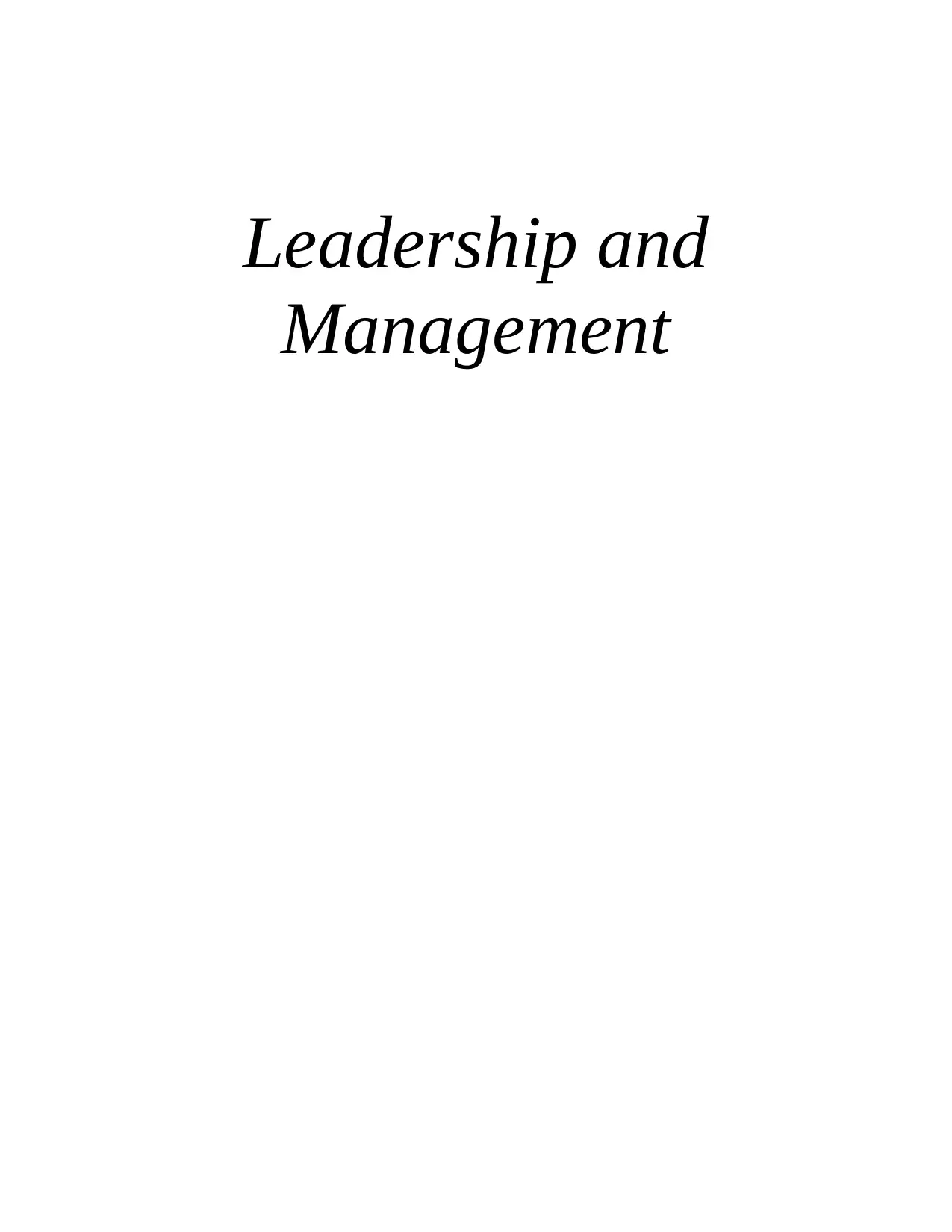
Leadership and
Management
Management
Paraphrase This Document
Need a fresh take? Get an instant paraphrase of this document with our AI Paraphraser
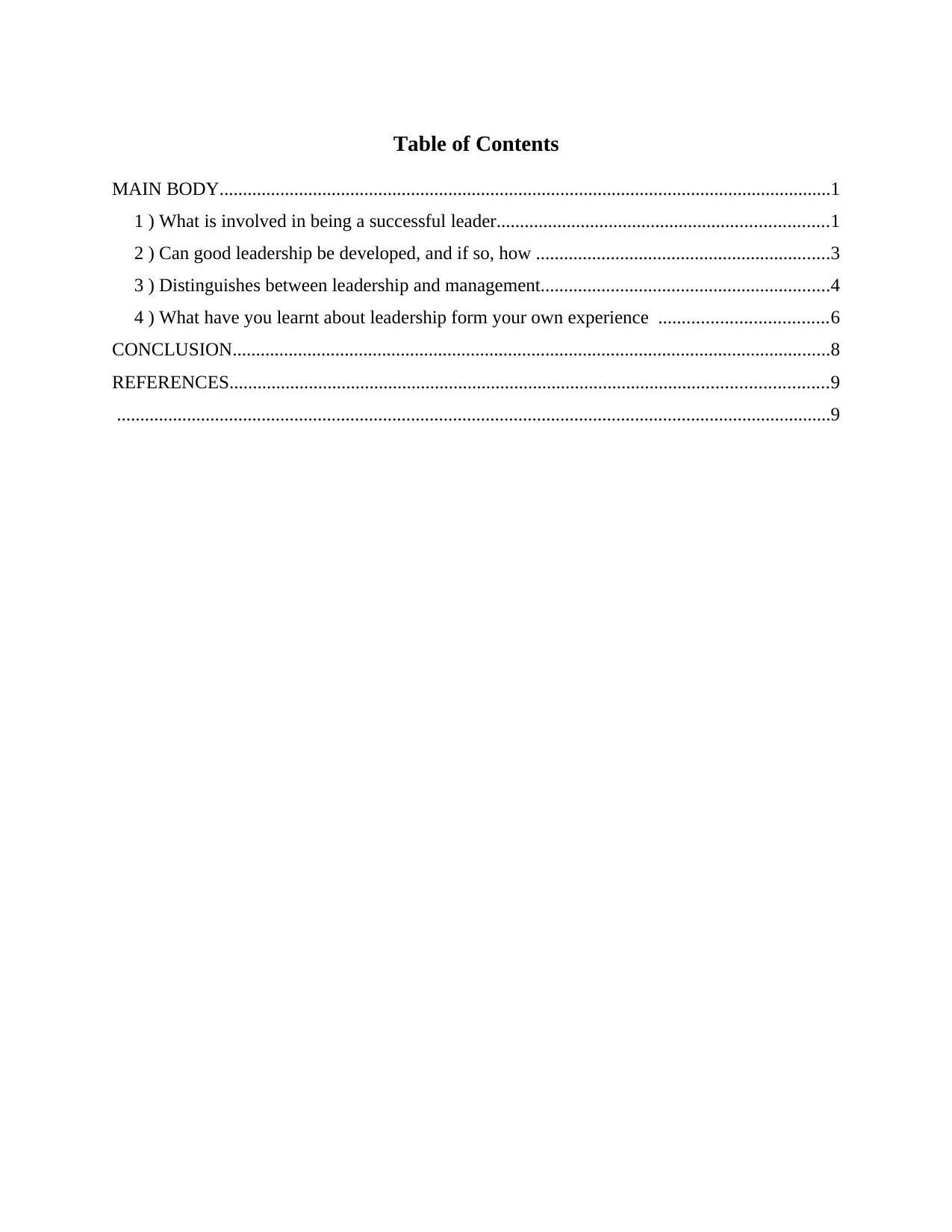
Table of Contents
MAIN BODY...................................................................................................................................1
1 ) What is involved in being a successful leader.......................................................................1
2 ) Can good leadership be developed, and if so, how ...............................................................3
3 ) Distinguishes between leadership and management..............................................................4
4 ) What have you learnt about leadership form your own experience ....................................6
CONCLUSION................................................................................................................................8
REFERENCES................................................................................................................................9
.........................................................................................................................................................9
MAIN BODY...................................................................................................................................1
1 ) What is involved in being a successful leader.......................................................................1
2 ) Can good leadership be developed, and if so, how ...............................................................3
3 ) Distinguishes between leadership and management..............................................................4
4 ) What have you learnt about leadership form your own experience ....................................6
CONCLUSION................................................................................................................................8
REFERENCES................................................................................................................................9
.........................................................................................................................................................9
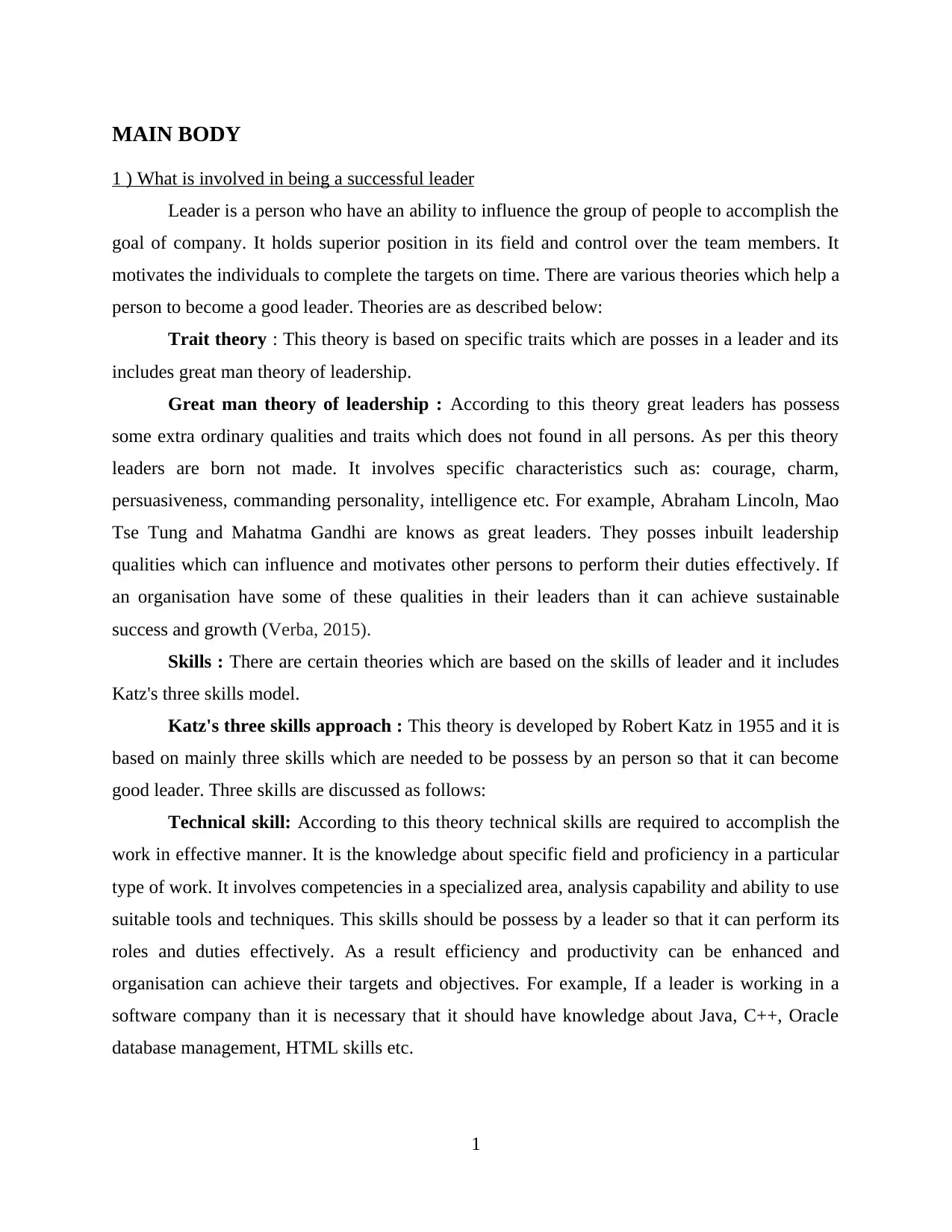
MAIN BODY
1 ) What is involved in being a successful leader
Leader is a person who have an ability to influence the group of people to accomplish the
goal of company. It holds superior position in its field and control over the team members. It
motivates the individuals to complete the targets on time. There are various theories which help a
person to become a good leader. Theories are as described below:
Trait theory : This theory is based on specific traits which are posses in a leader and its
includes great man theory of leadership.
Great man theory of leadership : According to this theory great leaders has possess
some extra ordinary qualities and traits which does not found in all persons. As per this theory
leaders are born not made. It involves specific characteristics such as: courage, charm,
persuasiveness, commanding personality, intelligence etc. For example, Abraham Lincoln, Mao
Tse Tung and Mahatma Gandhi are knows as great leaders. They posses inbuilt leadership
qualities which can influence and motivates other persons to perform their duties effectively. If
an organisation have some of these qualities in their leaders than it can achieve sustainable
success and growth (Verba, 2015).
Skills : There are certain theories which are based on the skills of leader and it includes
Katz's three skills model.
Katz's three skills approach : This theory is developed by Robert Katz in 1955 and it is
based on mainly three skills which are needed to be possess by an person so that it can become
good leader. Three skills are discussed as follows:
Technical skill: According to this theory technical skills are required to accomplish the
work in effective manner. It is the knowledge about specific field and proficiency in a particular
type of work. It involves competencies in a specialized area, analysis capability and ability to use
suitable tools and techniques. This skills should be possess by a leader so that it can perform its
roles and duties effectively. As a result efficiency and productivity can be enhanced and
organisation can achieve their targets and objectives. For example, If a leader is working in a
software company than it is necessary that it should have knowledge about Java, C++, Oracle
database management, HTML skills etc.
1
1 ) What is involved in being a successful leader
Leader is a person who have an ability to influence the group of people to accomplish the
goal of company. It holds superior position in its field and control over the team members. It
motivates the individuals to complete the targets on time. There are various theories which help a
person to become a good leader. Theories are as described below:
Trait theory : This theory is based on specific traits which are posses in a leader and its
includes great man theory of leadership.
Great man theory of leadership : According to this theory great leaders has possess
some extra ordinary qualities and traits which does not found in all persons. As per this theory
leaders are born not made. It involves specific characteristics such as: courage, charm,
persuasiveness, commanding personality, intelligence etc. For example, Abraham Lincoln, Mao
Tse Tung and Mahatma Gandhi are knows as great leaders. They posses inbuilt leadership
qualities which can influence and motivates other persons to perform their duties effectively. If
an organisation have some of these qualities in their leaders than it can achieve sustainable
success and growth (Verba, 2015).
Skills : There are certain theories which are based on the skills of leader and it includes
Katz's three skills model.
Katz's three skills approach : This theory is developed by Robert Katz in 1955 and it is
based on mainly three skills which are needed to be possess by an person so that it can become
good leader. Three skills are discussed as follows:
Technical skill: According to this theory technical skills are required to accomplish the
work in effective manner. It is the knowledge about specific field and proficiency in a particular
type of work. It involves competencies in a specialized area, analysis capability and ability to use
suitable tools and techniques. This skills should be possess by a leader so that it can perform its
roles and duties effectively. As a result efficiency and productivity can be enhanced and
organisation can achieve their targets and objectives. For example, If a leader is working in a
software company than it is necessary that it should have knowledge about Java, C++, Oracle
database management, HTML skills etc.
1
⊘ This is a preview!⊘
Do you want full access?
Subscribe today to unlock all pages.

Trusted by 1+ million students worldwide
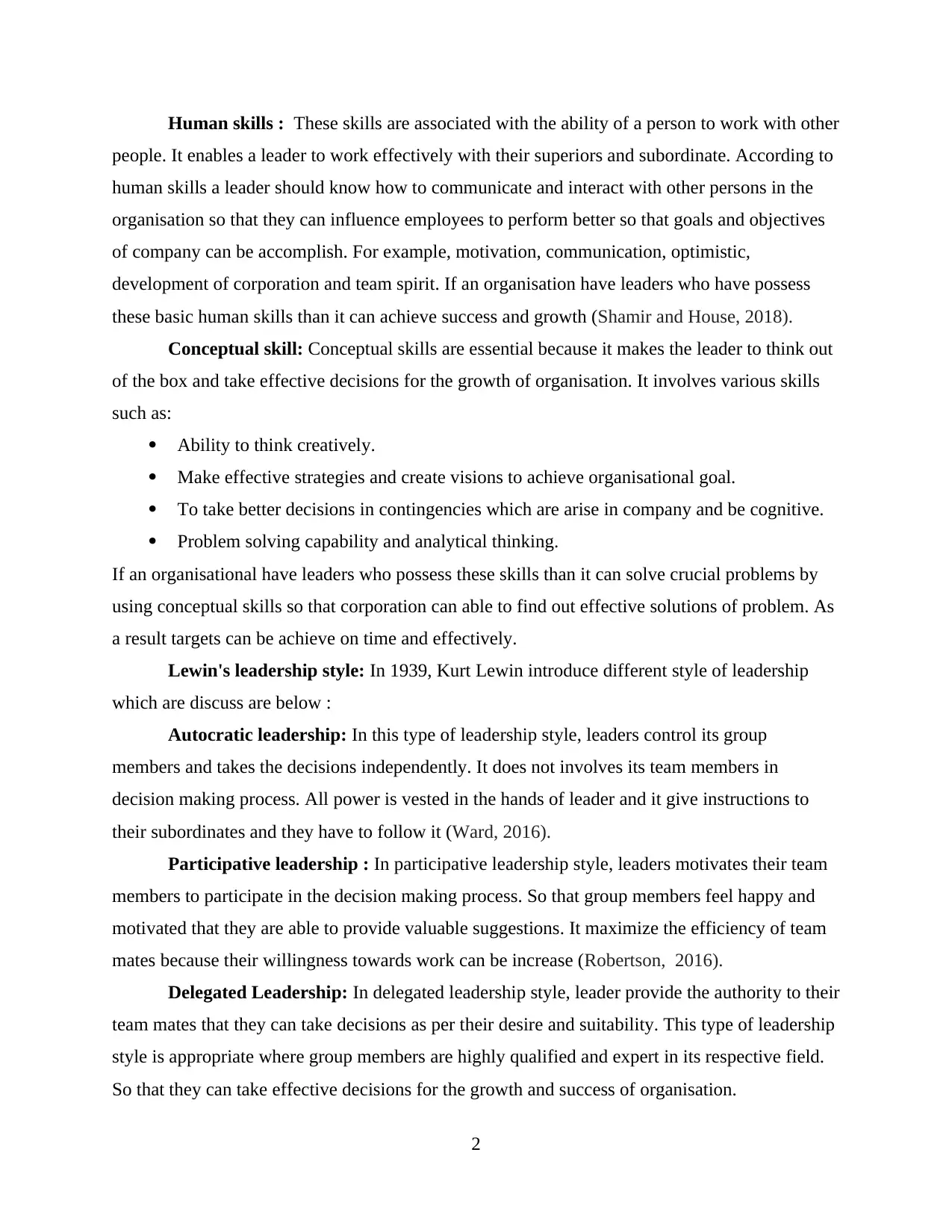
Human skills : These skills are associated with the ability of a person to work with other
people. It enables a leader to work effectively with their superiors and subordinate. According to
human skills a leader should know how to communicate and interact with other persons in the
organisation so that they can influence employees to perform better so that goals and objectives
of company can be accomplish. For example, motivation, communication, optimistic,
development of corporation and team spirit. If an organisation have leaders who have possess
these basic human skills than it can achieve success and growth (Shamir and House, 2018).
Conceptual skill: Conceptual skills are essential because it makes the leader to think out
of the box and take effective decisions for the growth of organisation. It involves various skills
such as:
Ability to think creatively.
Make effective strategies and create visions to achieve organisational goal.
To take better decisions in contingencies which are arise in company and be cognitive.
Problem solving capability and analytical thinking.
If an organisational have leaders who possess these skills than it can solve crucial problems by
using conceptual skills so that corporation can able to find out effective solutions of problem. As
a result targets can be achieve on time and effectively.
Lewin's leadership style: In 1939, Kurt Lewin introduce different style of leadership
which are discuss are below :
Autocratic leadership: In this type of leadership style, leaders control its group
members and takes the decisions independently. It does not involves its team members in
decision making process. All power is vested in the hands of leader and it give instructions to
their subordinates and they have to follow it (Ward, 2016).
Participative leadership : In participative leadership style, leaders motivates their team
members to participate in the decision making process. So that group members feel happy and
motivated that they are able to provide valuable suggestions. It maximize the efficiency of team
mates because their willingness towards work can be increase (Robertson, 2016).
Delegated Leadership: In delegated leadership style, leader provide the authority to their
team mates that they can take decisions as per their desire and suitability. This type of leadership
style is appropriate where group members are highly qualified and expert in its respective field.
So that they can take effective decisions for the growth and success of organisation.
2
people. It enables a leader to work effectively with their superiors and subordinate. According to
human skills a leader should know how to communicate and interact with other persons in the
organisation so that they can influence employees to perform better so that goals and objectives
of company can be accomplish. For example, motivation, communication, optimistic,
development of corporation and team spirit. If an organisation have leaders who have possess
these basic human skills than it can achieve success and growth (Shamir and House, 2018).
Conceptual skill: Conceptual skills are essential because it makes the leader to think out
of the box and take effective decisions for the growth of organisation. It involves various skills
such as:
Ability to think creatively.
Make effective strategies and create visions to achieve organisational goal.
To take better decisions in contingencies which are arise in company and be cognitive.
Problem solving capability and analytical thinking.
If an organisational have leaders who possess these skills than it can solve crucial problems by
using conceptual skills so that corporation can able to find out effective solutions of problem. As
a result targets can be achieve on time and effectively.
Lewin's leadership style: In 1939, Kurt Lewin introduce different style of leadership
which are discuss are below :
Autocratic leadership: In this type of leadership style, leaders control its group
members and takes the decisions independently. It does not involves its team members in
decision making process. All power is vested in the hands of leader and it give instructions to
their subordinates and they have to follow it (Ward, 2016).
Participative leadership : In participative leadership style, leaders motivates their team
members to participate in the decision making process. So that group members feel happy and
motivated that they are able to provide valuable suggestions. It maximize the efficiency of team
mates because their willingness towards work can be increase (Robertson, 2016).
Delegated Leadership: In delegated leadership style, leader provide the authority to their
team mates that they can take decisions as per their desire and suitability. This type of leadership
style is appropriate where group members are highly qualified and expert in its respective field.
So that they can take effective decisions for the growth and success of organisation.
2
Paraphrase This Document
Need a fresh take? Get an instant paraphrase of this document with our AI Paraphraser
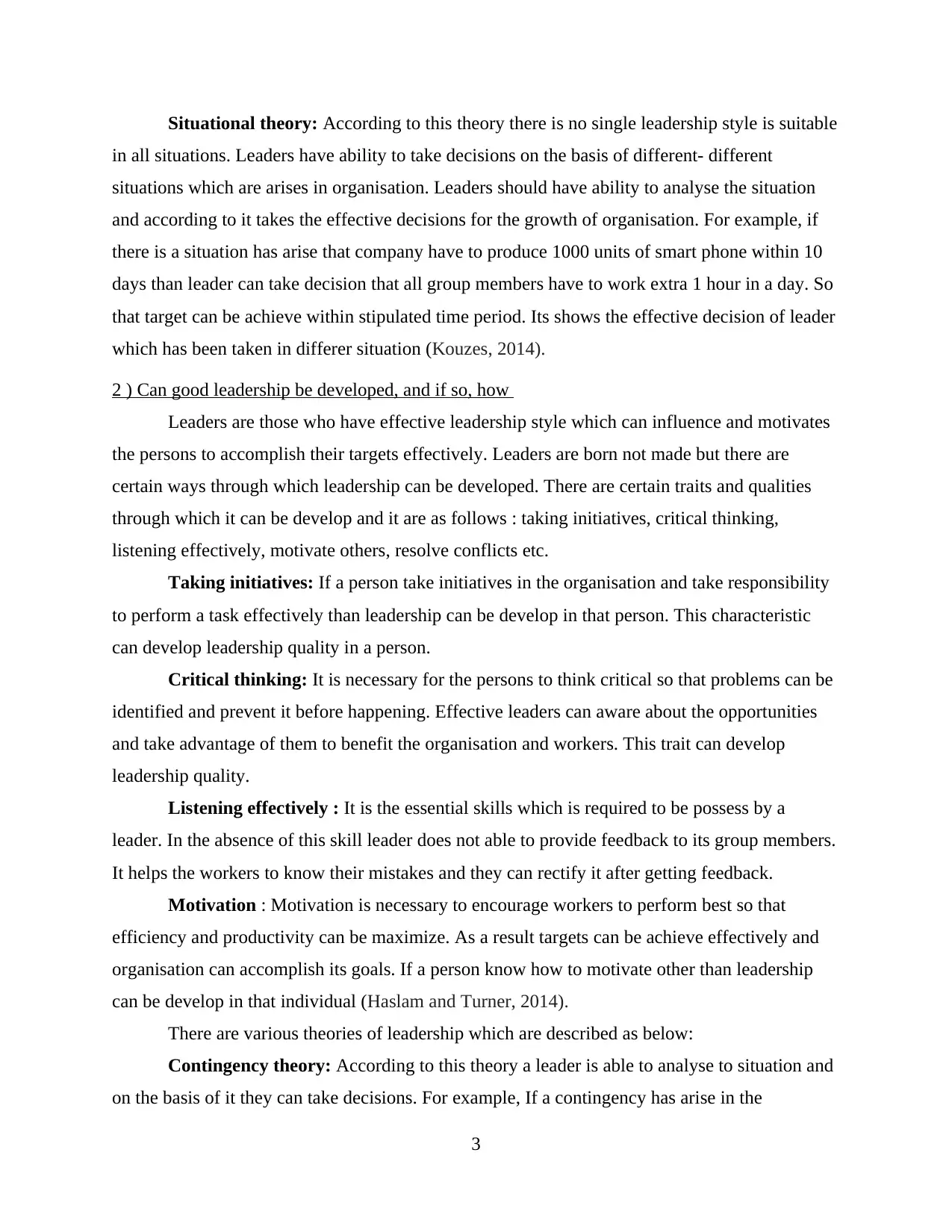
Situational theory: According to this theory there is no single leadership style is suitable
in all situations. Leaders have ability to take decisions on the basis of different- different
situations which are arises in organisation. Leaders should have ability to analyse the situation
and according to it takes the effective decisions for the growth of organisation. For example, if
there is a situation has arise that company have to produce 1000 units of smart phone within 10
days than leader can take decision that all group members have to work extra 1 hour in a day. So
that target can be achieve within stipulated time period. Its shows the effective decision of leader
which has been taken in differer situation (Kouzes, 2014).
2 ) Can good leadership be developed, and if so, how
Leaders are those who have effective leadership style which can influence and motivates
the persons to accomplish their targets effectively. Leaders are born not made but there are
certain ways through which leadership can be developed. There are certain traits and qualities
through which it can be develop and it are as follows : taking initiatives, critical thinking,
listening effectively, motivate others, resolve conflicts etc.
Taking initiatives: If a person take initiatives in the organisation and take responsibility
to perform a task effectively than leadership can be develop in that person. This characteristic
can develop leadership quality in a person.
Critical thinking: It is necessary for the persons to think critical so that problems can be
identified and prevent it before happening. Effective leaders can aware about the opportunities
and take advantage of them to benefit the organisation and workers. This trait can develop
leadership quality.
Listening effectively : It is the essential skills which is required to be possess by a
leader. In the absence of this skill leader does not able to provide feedback to its group members.
It helps the workers to know their mistakes and they can rectify it after getting feedback.
Motivation : Motivation is necessary to encourage workers to perform best so that
efficiency and productivity can be maximize. As a result targets can be achieve effectively and
organisation can accomplish its goals. If a person know how to motivate other than leadership
can be develop in that individual (Haslam and Turner, 2014).
There are various theories of leadership which are described as below:
Contingency theory: According to this theory a leader is able to analyse to situation and
on the basis of it they can take decisions. For example, If a contingency has arise in the
3
in all situations. Leaders have ability to take decisions on the basis of different- different
situations which are arises in organisation. Leaders should have ability to analyse the situation
and according to it takes the effective decisions for the growth of organisation. For example, if
there is a situation has arise that company have to produce 1000 units of smart phone within 10
days than leader can take decision that all group members have to work extra 1 hour in a day. So
that target can be achieve within stipulated time period. Its shows the effective decision of leader
which has been taken in differer situation (Kouzes, 2014).
2 ) Can good leadership be developed, and if so, how
Leaders are those who have effective leadership style which can influence and motivates
the persons to accomplish their targets effectively. Leaders are born not made but there are
certain ways through which leadership can be developed. There are certain traits and qualities
through which it can be develop and it are as follows : taking initiatives, critical thinking,
listening effectively, motivate others, resolve conflicts etc.
Taking initiatives: If a person take initiatives in the organisation and take responsibility
to perform a task effectively than leadership can be develop in that person. This characteristic
can develop leadership quality in a person.
Critical thinking: It is necessary for the persons to think critical so that problems can be
identified and prevent it before happening. Effective leaders can aware about the opportunities
and take advantage of them to benefit the organisation and workers. This trait can develop
leadership quality.
Listening effectively : It is the essential skills which is required to be possess by a
leader. In the absence of this skill leader does not able to provide feedback to its group members.
It helps the workers to know their mistakes and they can rectify it after getting feedback.
Motivation : Motivation is necessary to encourage workers to perform best so that
efficiency and productivity can be maximize. As a result targets can be achieve effectively and
organisation can accomplish its goals. If a person know how to motivate other than leadership
can be develop in that individual (Haslam and Turner, 2014).
There are various theories of leadership which are described as below:
Contingency theory: According to this theory a leader is able to analyse to situation and
on the basis of it they can take decisions. For example, If a contingency has arise in the
3
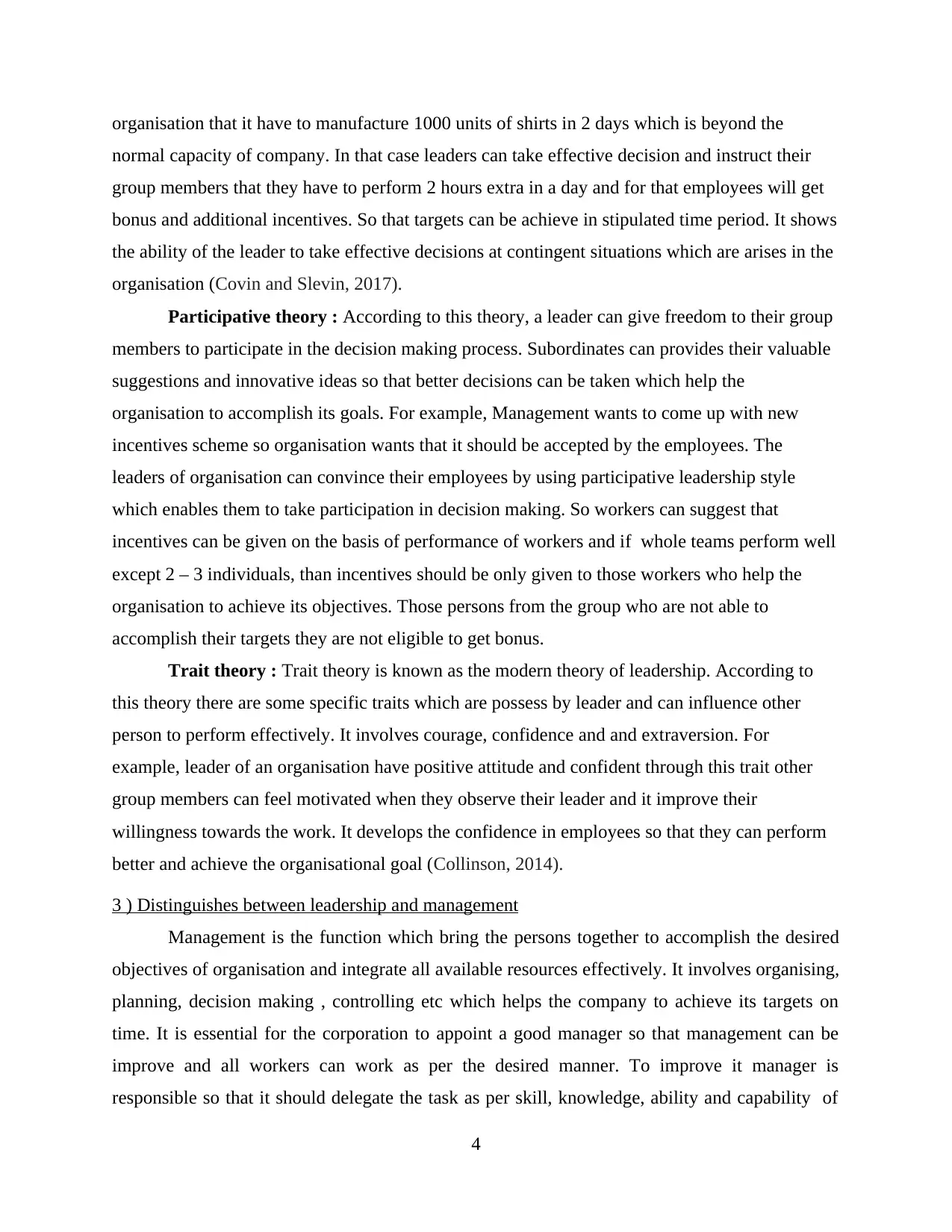
organisation that it have to manufacture 1000 units of shirts in 2 days which is beyond the
normal capacity of company. In that case leaders can take effective decision and instruct their
group members that they have to perform 2 hours extra in a day and for that employees will get
bonus and additional incentives. So that targets can be achieve in stipulated time period. It shows
the ability of the leader to take effective decisions at contingent situations which are arises in the
organisation (Covin and Slevin, 2017).
Participative theory : According to this theory, a leader can give freedom to their group
members to participate in the decision making process. Subordinates can provides their valuable
suggestions and innovative ideas so that better decisions can be taken which help the
organisation to accomplish its goals. For example, Management wants to come up with new
incentives scheme so organisation wants that it should be accepted by the employees. The
leaders of organisation can convince their employees by using participative leadership style
which enables them to take participation in decision making. So workers can suggest that
incentives can be given on the basis of performance of workers and if whole teams perform well
except 2 – 3 individuals, than incentives should be only given to those workers who help the
organisation to achieve its objectives. Those persons from the group who are not able to
accomplish their targets they are not eligible to get bonus.
Trait theory : Trait theory is known as the modern theory of leadership. According to
this theory there are some specific traits which are possess by leader and can influence other
person to perform effectively. It involves courage, confidence and and extraversion. For
example, leader of an organisation have positive attitude and confident through this trait other
group members can feel motivated when they observe their leader and it improve their
willingness towards the work. It develops the confidence in employees so that they can perform
better and achieve the organisational goal (Collinson, 2014).
3 ) Distinguishes between leadership and management
Management is the function which bring the persons together to accomplish the desired
objectives of organisation and integrate all available resources effectively. It involves organising,
planning, decision making , controlling etc which helps the company to achieve its targets on
time. It is essential for the corporation to appoint a good manager so that management can be
improve and all workers can work as per the desired manner. To improve it manager is
responsible so that it should delegate the task as per skill, knowledge, ability and capability of
4
normal capacity of company. In that case leaders can take effective decision and instruct their
group members that they have to perform 2 hours extra in a day and for that employees will get
bonus and additional incentives. So that targets can be achieve in stipulated time period. It shows
the ability of the leader to take effective decisions at contingent situations which are arises in the
organisation (Covin and Slevin, 2017).
Participative theory : According to this theory, a leader can give freedom to their group
members to participate in the decision making process. Subordinates can provides their valuable
suggestions and innovative ideas so that better decisions can be taken which help the
organisation to accomplish its goals. For example, Management wants to come up with new
incentives scheme so organisation wants that it should be accepted by the employees. The
leaders of organisation can convince their employees by using participative leadership style
which enables them to take participation in decision making. So workers can suggest that
incentives can be given on the basis of performance of workers and if whole teams perform well
except 2 – 3 individuals, than incentives should be only given to those workers who help the
organisation to achieve its objectives. Those persons from the group who are not able to
accomplish their targets they are not eligible to get bonus.
Trait theory : Trait theory is known as the modern theory of leadership. According to
this theory there are some specific traits which are possess by leader and can influence other
person to perform effectively. It involves courage, confidence and and extraversion. For
example, leader of an organisation have positive attitude and confident through this trait other
group members can feel motivated when they observe their leader and it improve their
willingness towards the work. It develops the confidence in employees so that they can perform
better and achieve the organisational goal (Collinson, 2014).
3 ) Distinguishes between leadership and management
Management is the function which bring the persons together to accomplish the desired
objectives of organisation and integrate all available resources effectively. It involves organising,
planning, decision making , controlling etc which helps the company to achieve its targets on
time. It is essential for the corporation to appoint a good manager so that management can be
improve and all workers can work as per the desired manner. To improve it manager is
responsible so that it should delegate the task as per skill, knowledge, ability and capability of
4
⊘ This is a preview!⊘
Do you want full access?
Subscribe today to unlock all pages.

Trusted by 1+ million students worldwide
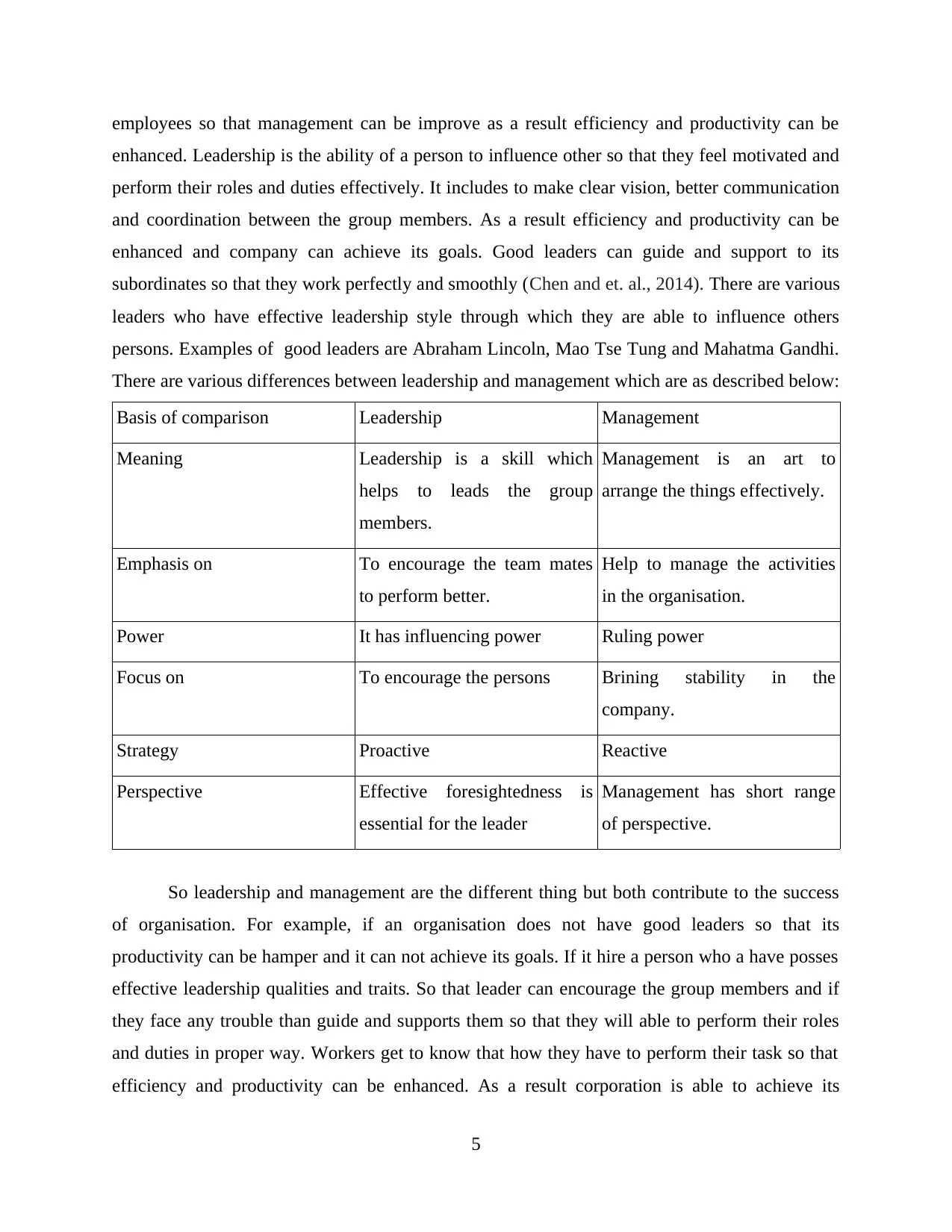
employees so that management can be improve as a result efficiency and productivity can be
enhanced. Leadership is the ability of a person to influence other so that they feel motivated and
perform their roles and duties effectively. It includes to make clear vision, better communication
and coordination between the group members. As a result efficiency and productivity can be
enhanced and company can achieve its goals. Good leaders can guide and support to its
subordinates so that they work perfectly and smoothly (Chen and et. al., 2014). There are various
leaders who have effective leadership style through which they are able to influence others
persons. Examples of good leaders are Abraham Lincoln, Mao Tse Tung and Mahatma Gandhi.
There are various differences between leadership and management which are as described below:
Basis of comparison Leadership Management
Meaning Leadership is a skill which
helps to leads the group
members.
Management is an art to
arrange the things effectively.
Emphasis on To encourage the team mates
to perform better.
Help to manage the activities
in the organisation.
Power It has influencing power Ruling power
Focus on To encourage the persons Brining stability in the
company.
Strategy Proactive Reactive
Perspective Effective foresightedness is
essential for the leader
Management has short range
of perspective.
So leadership and management are the different thing but both contribute to the success
of organisation. For example, if an organisation does not have good leaders so that its
productivity can be hamper and it can not achieve its goals. If it hire a person who a have posses
effective leadership qualities and traits. So that leader can encourage the group members and if
they face any trouble than guide and supports them so that they will able to perform their roles
and duties in proper way. Workers get to know that how they have to perform their task so that
efficiency and productivity can be enhanced. As a result corporation is able to achieve its
5
enhanced. Leadership is the ability of a person to influence other so that they feel motivated and
perform their roles and duties effectively. It includes to make clear vision, better communication
and coordination between the group members. As a result efficiency and productivity can be
enhanced and company can achieve its goals. Good leaders can guide and support to its
subordinates so that they work perfectly and smoothly (Chen and et. al., 2014). There are various
leaders who have effective leadership style through which they are able to influence others
persons. Examples of good leaders are Abraham Lincoln, Mao Tse Tung and Mahatma Gandhi.
There are various differences between leadership and management which are as described below:
Basis of comparison Leadership Management
Meaning Leadership is a skill which
helps to leads the group
members.
Management is an art to
arrange the things effectively.
Emphasis on To encourage the team mates
to perform better.
Help to manage the activities
in the organisation.
Power It has influencing power Ruling power
Focus on To encourage the persons Brining stability in the
company.
Strategy Proactive Reactive
Perspective Effective foresightedness is
essential for the leader
Management has short range
of perspective.
So leadership and management are the different thing but both contribute to the success
of organisation. For example, if an organisation does not have good leaders so that its
productivity can be hamper and it can not achieve its goals. If it hire a person who a have posses
effective leadership qualities and traits. So that leader can encourage the group members and if
they face any trouble than guide and supports them so that they will able to perform their roles
and duties in proper way. Workers get to know that how they have to perform their task so that
efficiency and productivity can be enhanced. As a result corporation is able to achieve its
5
Paraphrase This Document
Need a fresh take? Get an instant paraphrase of this document with our AI Paraphraser
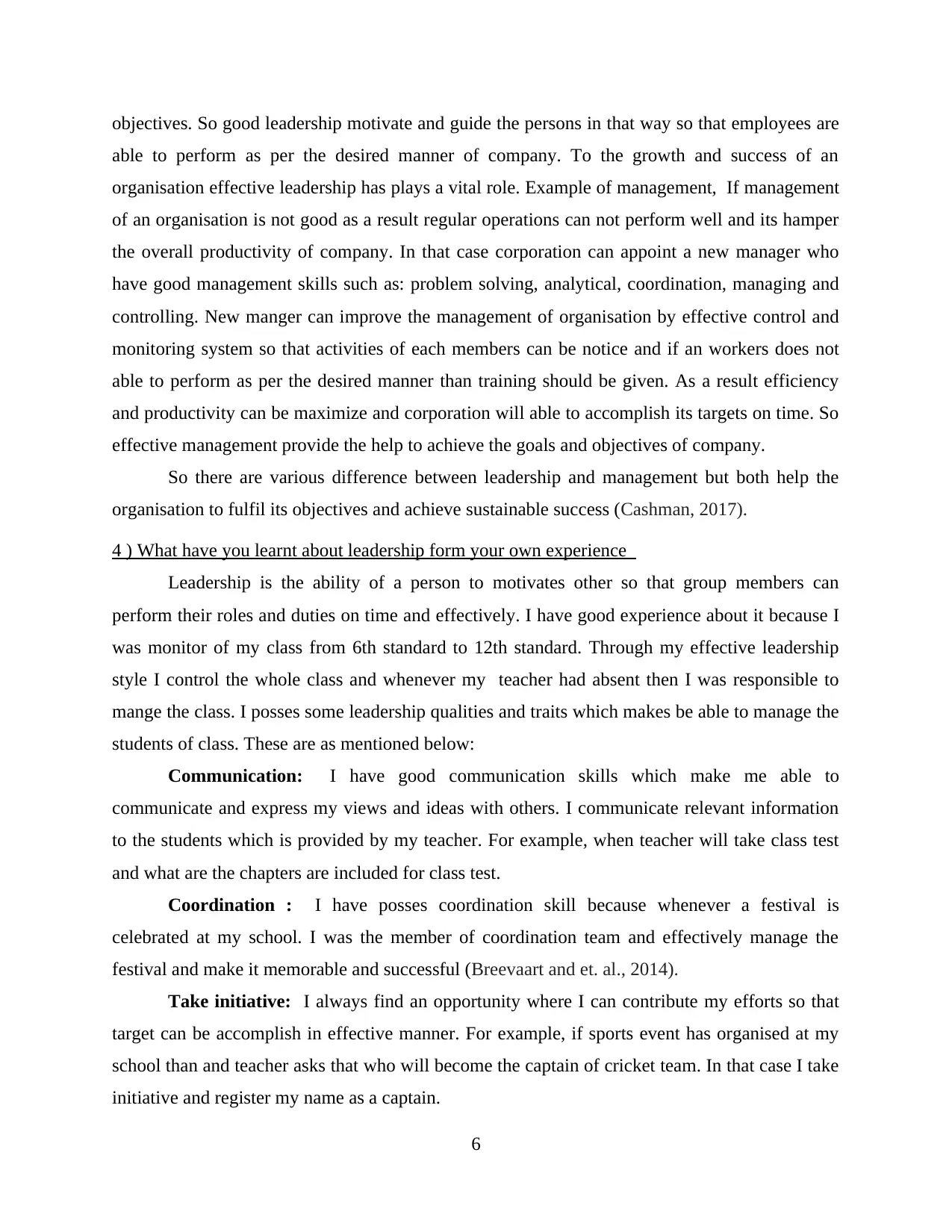
objectives. So good leadership motivate and guide the persons in that way so that employees are
able to perform as per the desired manner of company. To the growth and success of an
organisation effective leadership has plays a vital role. Example of management, If management
of an organisation is not good as a result regular operations can not perform well and its hamper
the overall productivity of company. In that case corporation can appoint a new manager who
have good management skills such as: problem solving, analytical, coordination, managing and
controlling. New manger can improve the management of organisation by effective control and
monitoring system so that activities of each members can be notice and if an workers does not
able to perform as per the desired manner than training should be given. As a result efficiency
and productivity can be maximize and corporation will able to accomplish its targets on time. So
effective management provide the help to achieve the goals and objectives of company.
So there are various difference between leadership and management but both help the
organisation to fulfil its objectives and achieve sustainable success (Cashman, 2017).
4 ) What have you learnt about leadership form your own experience
Leadership is the ability of a person to motivates other so that group members can
perform their roles and duties on time and effectively. I have good experience about it because I
was monitor of my class from 6th standard to 12th standard. Through my effective leadership
style I control the whole class and whenever my teacher had absent then I was responsible to
mange the class. I posses some leadership qualities and traits which makes be able to manage the
students of class. These are as mentioned below:
Communication: I have good communication skills which make me able to
communicate and express my views and ideas with others. I communicate relevant information
to the students which is provided by my teacher. For example, when teacher will take class test
and what are the chapters are included for class test.
Coordination : I have posses coordination skill because whenever a festival is
celebrated at my school. I was the member of coordination team and effectively manage the
festival and make it memorable and successful (Breevaart and et. al., 2014).
Take initiative: I always find an opportunity where I can contribute my efforts so that
target can be accomplish in effective manner. For example, if sports event has organised at my
school than and teacher asks that who will become the captain of cricket team. In that case I take
initiative and register my name as a captain.
6
able to perform as per the desired manner of company. To the growth and success of an
organisation effective leadership has plays a vital role. Example of management, If management
of an organisation is not good as a result regular operations can not perform well and its hamper
the overall productivity of company. In that case corporation can appoint a new manager who
have good management skills such as: problem solving, analytical, coordination, managing and
controlling. New manger can improve the management of organisation by effective control and
monitoring system so that activities of each members can be notice and if an workers does not
able to perform as per the desired manner than training should be given. As a result efficiency
and productivity can be maximize and corporation will able to accomplish its targets on time. So
effective management provide the help to achieve the goals and objectives of company.
So there are various difference between leadership and management but both help the
organisation to fulfil its objectives and achieve sustainable success (Cashman, 2017).
4 ) What have you learnt about leadership form your own experience
Leadership is the ability of a person to motivates other so that group members can
perform their roles and duties on time and effectively. I have good experience about it because I
was monitor of my class from 6th standard to 12th standard. Through my effective leadership
style I control the whole class and whenever my teacher had absent then I was responsible to
mange the class. I posses some leadership qualities and traits which makes be able to manage the
students of class. These are as mentioned below:
Communication: I have good communication skills which make me able to
communicate and express my views and ideas with others. I communicate relevant information
to the students which is provided by my teacher. For example, when teacher will take class test
and what are the chapters are included for class test.
Coordination : I have posses coordination skill because whenever a festival is
celebrated at my school. I was the member of coordination team and effectively manage the
festival and make it memorable and successful (Breevaart and et. al., 2014).
Take initiative: I always find an opportunity where I can contribute my efforts so that
target can be accomplish in effective manner. For example, if sports event has organised at my
school than and teacher asks that who will become the captain of cricket team. In that case I take
initiative and register my name as a captain.
6
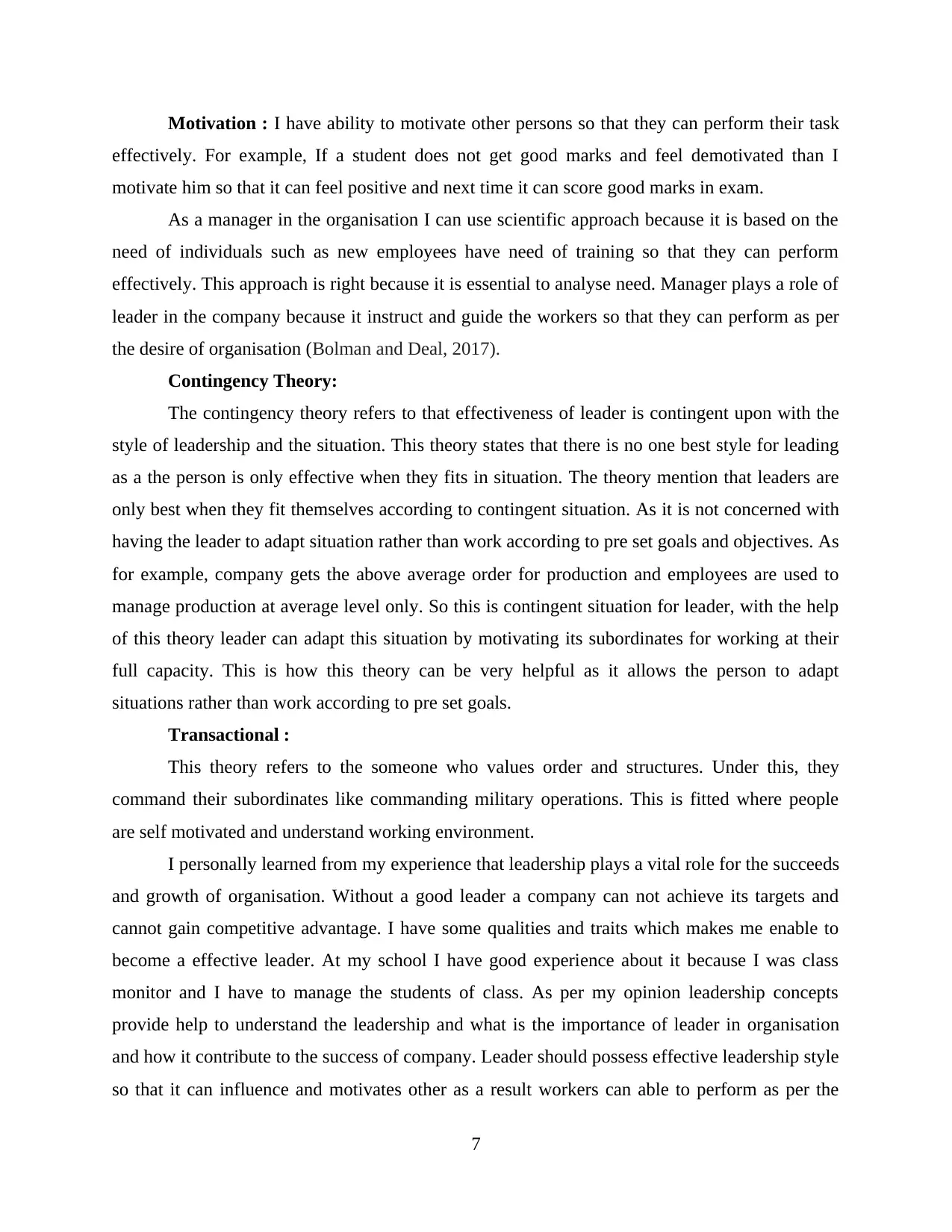
Motivation : I have ability to motivate other persons so that they can perform their task
effectively. For example, If a student does not get good marks and feel demotivated than I
motivate him so that it can feel positive and next time it can score good marks in exam.
As a manager in the organisation I can use scientific approach because it is based on the
need of individuals such as new employees have need of training so that they can perform
effectively. This approach is right because it is essential to analyse need. Manager plays a role of
leader in the company because it instruct and guide the workers so that they can perform as per
the desire of organisation (Bolman and Deal, 2017).
Contingency Theory:
The contingency theory refers to that effectiveness of leader is contingent upon with the
style of leadership and the situation. This theory states that there is no one best style for leading
as a the person is only effective when they fits in situation. The theory mention that leaders are
only best when they fit themselves according to contingent situation. As it is not concerned with
having the leader to adapt situation rather than work according to pre set goals and objectives. As
for example, company gets the above average order for production and employees are used to
manage production at average level only. So this is contingent situation for leader, with the help
of this theory leader can adapt this situation by motivating its subordinates for working at their
full capacity. This is how this theory can be very helpful as it allows the person to adapt
situations rather than work according to pre set goals.
Transactional :
This theory refers to the someone who values order and structures. Under this, they
command their subordinates like commanding military operations. This is fitted where people
are self motivated and understand working environment.
I personally learned from my experience that leadership plays a vital role for the succeeds
and growth of organisation. Without a good leader a company can not achieve its targets and
cannot gain competitive advantage. I have some qualities and traits which makes me enable to
become a effective leader. At my school I have good experience about it because I was class
monitor and I have to manage the students of class. As per my opinion leadership concepts
provide help to understand the leadership and what is the importance of leader in organisation
and how it contribute to the success of company. Leader should possess effective leadership style
so that it can influence and motivates other as a result workers can able to perform as per the
7
effectively. For example, If a student does not get good marks and feel demotivated than I
motivate him so that it can feel positive and next time it can score good marks in exam.
As a manager in the organisation I can use scientific approach because it is based on the
need of individuals such as new employees have need of training so that they can perform
effectively. This approach is right because it is essential to analyse need. Manager plays a role of
leader in the company because it instruct and guide the workers so that they can perform as per
the desire of organisation (Bolman and Deal, 2017).
Contingency Theory:
The contingency theory refers to that effectiveness of leader is contingent upon with the
style of leadership and the situation. This theory states that there is no one best style for leading
as a the person is only effective when they fits in situation. The theory mention that leaders are
only best when they fit themselves according to contingent situation. As it is not concerned with
having the leader to adapt situation rather than work according to pre set goals and objectives. As
for example, company gets the above average order for production and employees are used to
manage production at average level only. So this is contingent situation for leader, with the help
of this theory leader can adapt this situation by motivating its subordinates for working at their
full capacity. This is how this theory can be very helpful as it allows the person to adapt
situations rather than work according to pre set goals.
Transactional :
This theory refers to the someone who values order and structures. Under this, they
command their subordinates like commanding military operations. This is fitted where people
are self motivated and understand working environment.
I personally learned from my experience that leadership plays a vital role for the succeeds
and growth of organisation. Without a good leader a company can not achieve its targets and
cannot gain competitive advantage. I have some qualities and traits which makes me enable to
become a effective leader. At my school I have good experience about it because I was class
monitor and I have to manage the students of class. As per my opinion leadership concepts
provide help to understand the leadership and what is the importance of leader in organisation
and how it contribute to the success of company. Leader should possess effective leadership style
so that it can influence and motivates other as a result workers can able to perform as per the
7
⊘ This is a preview!⊘
Do you want full access?
Subscribe today to unlock all pages.

Trusted by 1+ million students worldwide
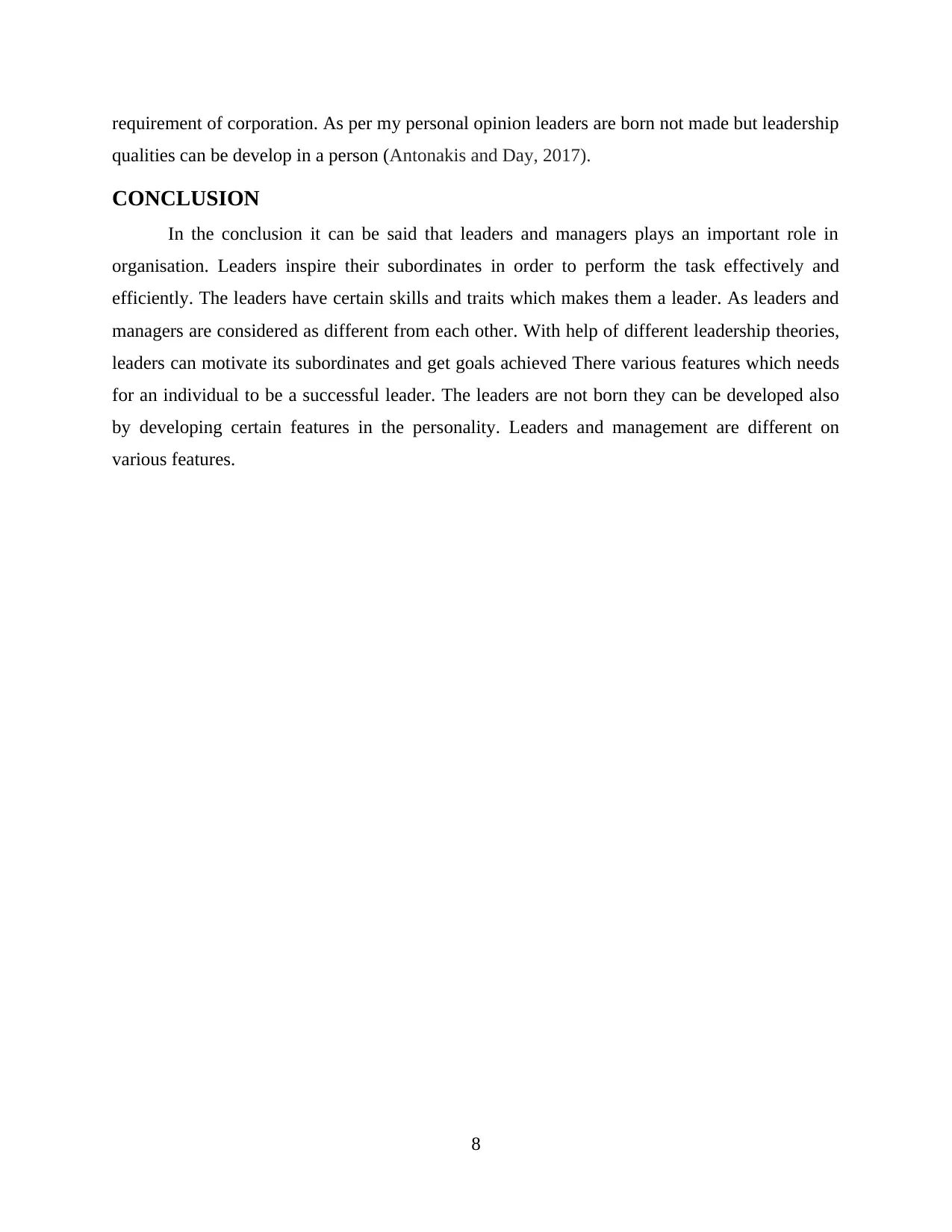
requirement of corporation. As per my personal opinion leaders are born not made but leadership
qualities can be develop in a person (Antonakis and Day, 2017).
CONCLUSION
In the conclusion it can be said that leaders and managers plays an important role in
organisation. Leaders inspire their subordinates in order to perform the task effectively and
efficiently. The leaders have certain skills and traits which makes them a leader. As leaders and
managers are considered as different from each other. With help of different leadership theories,
leaders can motivate its subordinates and get goals achieved There various features which needs
for an individual to be a successful leader. The leaders are not born they can be developed also
by developing certain features in the personality. Leaders and management are different on
various features.
8
qualities can be develop in a person (Antonakis and Day, 2017).
CONCLUSION
In the conclusion it can be said that leaders and managers plays an important role in
organisation. Leaders inspire their subordinates in order to perform the task effectively and
efficiently. The leaders have certain skills and traits which makes them a leader. As leaders and
managers are considered as different from each other. With help of different leadership theories,
leaders can motivate its subordinates and get goals achieved There various features which needs
for an individual to be a successful leader. The leaders are not born they can be developed also
by developing certain features in the personality. Leaders and management are different on
various features.
8
Paraphrase This Document
Need a fresh take? Get an instant paraphrase of this document with our AI Paraphraser
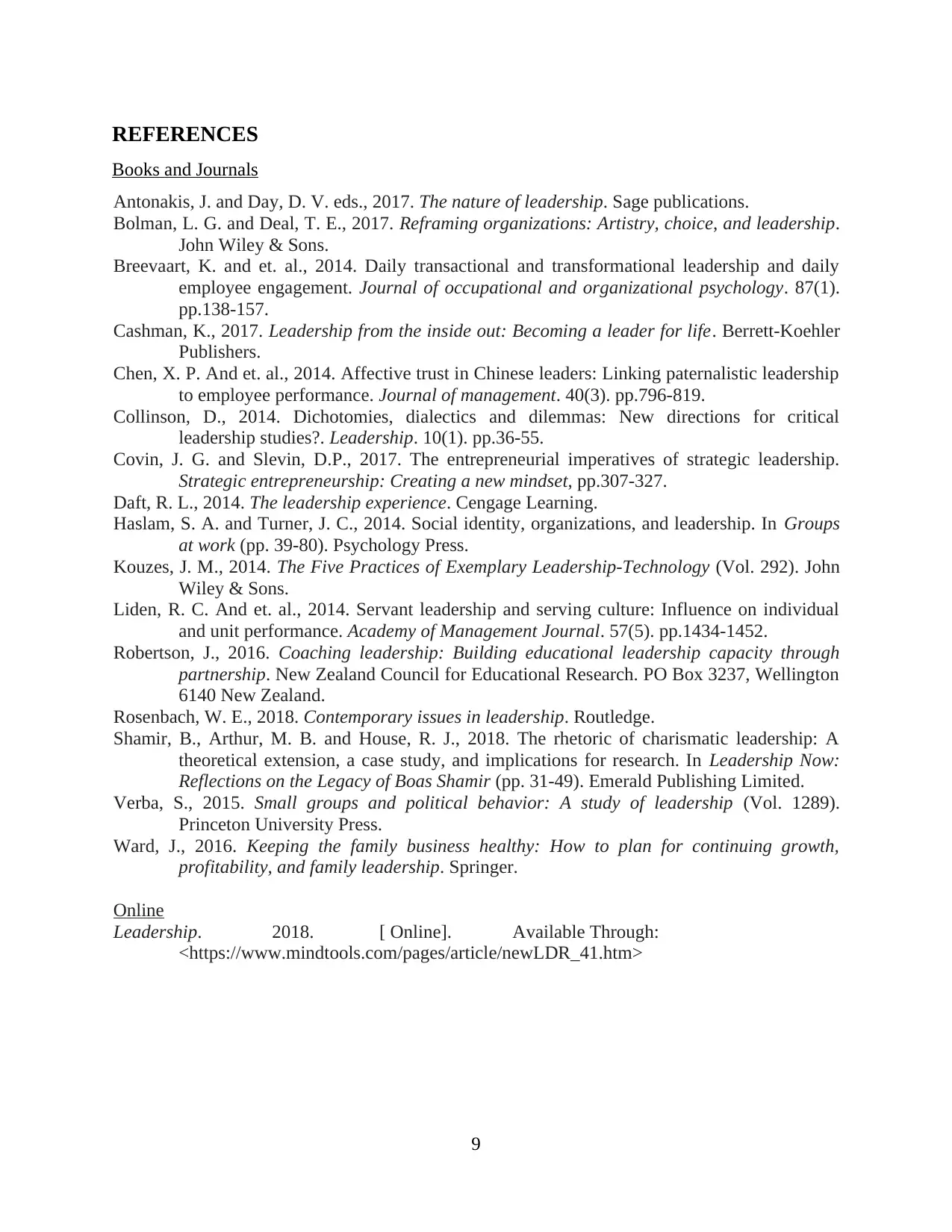
REFERENCES
Books and Journals
Antonakis, J. and Day, D. V. eds., 2017. The nature of leadership. Sage publications.
Bolman, L. G. and Deal, T. E., 2017. Reframing organizations: Artistry, choice, and leadership.
John Wiley & Sons.
Breevaart, K. and et. al., 2014. Daily transactional and transformational leadership and daily
employee engagement. Journal of occupational and organizational psychology. 87(1).
pp.138-157.
Cashman, K., 2017. Leadership from the inside out: Becoming a leader for life. Berrett-Koehler
Publishers.
Chen, X. P. And et. al., 2014. Affective trust in Chinese leaders: Linking paternalistic leadership
to employee performance. Journal of management. 40(3). pp.796-819.
Collinson, D., 2014. Dichotomies, dialectics and dilemmas: New directions for critical
leadership studies?. Leadership. 10(1). pp.36-55.
Covin, J. G. and Slevin, D.P., 2017. The entrepreneurial imperatives of strategic leadership.
Strategic entrepreneurship: Creating a new mindset, pp.307-327.
Daft, R. L., 2014. The leadership experience. Cengage Learning.
Haslam, S. A. and Turner, J. C., 2014. Social identity, organizations, and leadership. In Groups
at work (pp. 39-80). Psychology Press.
Kouzes, J. M., 2014. The Five Practices of Exemplary Leadership-Technology (Vol. 292). John
Wiley & Sons.
Liden, R. C. And et. al., 2014. Servant leadership and serving culture: Influence on individual
and unit performance. Academy of Management Journal. 57(5). pp.1434-1452.
Robertson, J., 2016. Coaching leadership: Building educational leadership capacity through
partnership. New Zealand Council for Educational Research. PO Box 3237, Wellington
6140 New Zealand.
Rosenbach, W. E., 2018. Contemporary issues in leadership. Routledge.
Shamir, B., Arthur, M. B. and House, R. J., 2018. The rhetoric of charismatic leadership: A
theoretical extension, a case study, and implications for research. In Leadership Now:
Reflections on the Legacy of Boas Shamir (pp. 31-49). Emerald Publishing Limited.
Verba, S., 2015. Small groups and political behavior: A study of leadership (Vol. 1289).
Princeton University Press.
Ward, J., 2016. Keeping the family business healthy: How to plan for continuing growth,
profitability, and family leadership. Springer.
Online
Leadership. 2018. [ Online]. Available Through:
<https://www.mindtools.com/pages/article/newLDR_41.htm>
9
Books and Journals
Antonakis, J. and Day, D. V. eds., 2017. The nature of leadership. Sage publications.
Bolman, L. G. and Deal, T. E., 2017. Reframing organizations: Artistry, choice, and leadership.
John Wiley & Sons.
Breevaart, K. and et. al., 2014. Daily transactional and transformational leadership and daily
employee engagement. Journal of occupational and organizational psychology. 87(1).
pp.138-157.
Cashman, K., 2017. Leadership from the inside out: Becoming a leader for life. Berrett-Koehler
Publishers.
Chen, X. P. And et. al., 2014. Affective trust in Chinese leaders: Linking paternalistic leadership
to employee performance. Journal of management. 40(3). pp.796-819.
Collinson, D., 2014. Dichotomies, dialectics and dilemmas: New directions for critical
leadership studies?. Leadership. 10(1). pp.36-55.
Covin, J. G. and Slevin, D.P., 2017. The entrepreneurial imperatives of strategic leadership.
Strategic entrepreneurship: Creating a new mindset, pp.307-327.
Daft, R. L., 2014. The leadership experience. Cengage Learning.
Haslam, S. A. and Turner, J. C., 2014. Social identity, organizations, and leadership. In Groups
at work (pp. 39-80). Psychology Press.
Kouzes, J. M., 2014. The Five Practices of Exemplary Leadership-Technology (Vol. 292). John
Wiley & Sons.
Liden, R. C. And et. al., 2014. Servant leadership and serving culture: Influence on individual
and unit performance. Academy of Management Journal. 57(5). pp.1434-1452.
Robertson, J., 2016. Coaching leadership: Building educational leadership capacity through
partnership. New Zealand Council for Educational Research. PO Box 3237, Wellington
6140 New Zealand.
Rosenbach, W. E., 2018. Contemporary issues in leadership. Routledge.
Shamir, B., Arthur, M. B. and House, R. J., 2018. The rhetoric of charismatic leadership: A
theoretical extension, a case study, and implications for research. In Leadership Now:
Reflections on the Legacy of Boas Shamir (pp. 31-49). Emerald Publishing Limited.
Verba, S., 2015. Small groups and political behavior: A study of leadership (Vol. 1289).
Princeton University Press.
Ward, J., 2016. Keeping the family business healthy: How to plan for continuing growth,
profitability, and family leadership. Springer.
Online
Leadership. 2018. [ Online]. Available Through:
<https://www.mindtools.com/pages/article/newLDR_41.htm>
9
1 out of 11
Related Documents
Your All-in-One AI-Powered Toolkit for Academic Success.
+13062052269
info@desklib.com
Available 24*7 on WhatsApp / Email
![[object Object]](/_next/static/media/star-bottom.7253800d.svg)
Unlock your academic potential
Copyright © 2020–2026 A2Z Services. All Rights Reserved. Developed and managed by ZUCOL.




